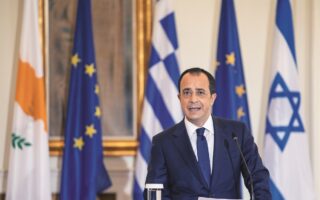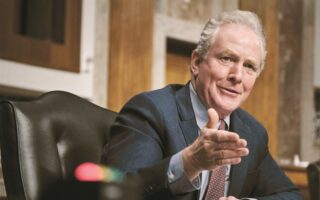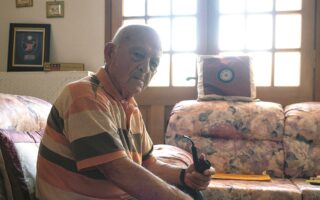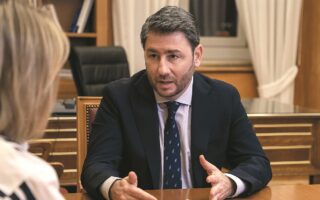Cyprus, a reliable partner
In interview with Kathimerini, outgoing president talks about management of main challenges, future of ethnically split island
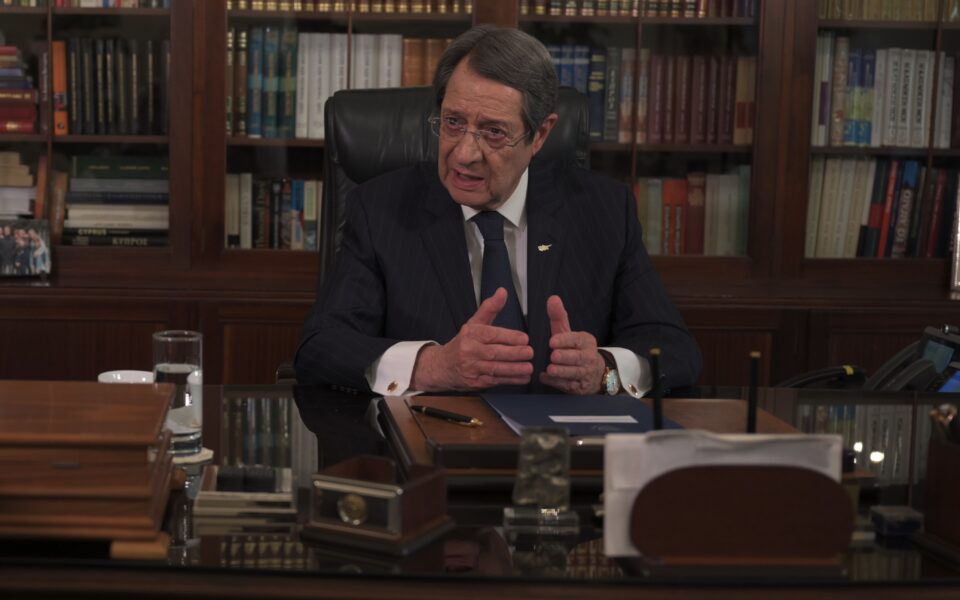
In an interview with Kathimerini shortly before he steps down as president of the Republic of Cyprus, Nicos Anastasiades takes stock of his 10-year tenure, looks back on his cooperation with three Greek prime ministers, and offers an assessment of the management of three major crises: the 2013 financial crisis, the Covid-19 pandemic, and Russia’s invasion of Ukraine.
In a lengthy conversation at his office in the Presidential Palace in Nicosia, the outgoing president stresses the Euro-Atlantic reorientation of the Mediterranean island’s foreign policy and expresses his grief over the failed reunification talks at Crans-Montana, where the two sides were “so close to finding a solution.” Describing Mustafa Akinci, the then Turkish-Cypriot leader, as “courageous,” Anastasiades blames Ankara for the collapse of the talks.
Admitting that mistakes were made in Cyprus’ passport scheme, Anastasiades looks to the future, voicing hope that efforts will resume to end the island’s division, and praises the character and abilities of President-elect Nikos Christodoulides, a former foreign minister and close associate of the outgoing president.
Let us begin the assessment of your 10-year term of office with a question regarding former presidents George Vassiliou, Glafcos Clerides, Tassos Papadopoulos, Demetris Christofias: How will they be judged?
History will of course be the judge of each of us. There is no president who hasn’t left a positive imprint. And certainly, no one among us has not made mistakes. From my point of view, the cooperation with the respective presidents – especially when I took over as party chairman for 16 years – and the cooperation regarding the management of the Cyprus issue was positive and helpful, but also sometimes judgmental. But that is within everyone’s roles and one’s own assessment of whether the president is handling [his duties] correctly or incorrectly, particularly the national issue. In other respects, the imprint is on the positive side for all presidents, with any potential mistakes, either committed by them or by their associates, for which the president would always be blamed.
And how about the cooperation you had during your time in office with three Greek prime ministers, Antonis Samaras, Alexis Tsipras and now Kyriakos Mitsotakis?
The cooperation with all the Greek prime ministers was excellent, but I cannot fail to mention Antonis Samaras, because it was with him that we launched the trilateral regional partnerships – with Egypt, Israel, Jordan and the Arabian Gulf. With Alexis Tsipras, we laid the foundations for MED7 initially, that is, the seven Mediterranean states, and then it became MED9, with the addition of Croatia and Slovenia. The cooperation with Kyriakos Mitsotakis was also excellent, with Greece’s absolute support when and wherever Cyprus needed to be supported. A timeless attitude. Since the fall of the junta, since the post-independence period, the relations between the Cypriot and the Greek governments were nothing like the pre-junta differences between Makarios and the Greek governments. There was a wise, consistent and constant support for the Cyprus issue. As a result of this excellent cooperation, Cyprus’ accession to the European Union was achieved under the Simitis government. A great achievement that Glafcos Clerides was working towards. Without the support of then Prime Minister Simitis and of the Greek Parliament, the accession of Cyprus would not have been possible – the accession of Cyprus and the strengthening of the Republic of Cyprus through the realization of its dream of being one of the European Union’s member-states, with all the positive effects this has had.
The financial crisis in 2013 and the haircut: Give us your assessment of the administration at the time, because there are also accusations of corruption and greed in relation to passports.
That was one of the most difficult times. Fifteen days after my election I had to be at the Eurogroup to discuss the signature of a memorandum, which was prepared in November three months before my election, but which my predecessor thought best to carry over to the next administration. Cyprus had then suffered 22 downgrades. It ranked, from an investment point of view, in the junk category. There was enough liquidity only for a month’s salary for the public sector employees and nobody was willing to lend us a single cent. The experience was painful, but brave decisions were needed. I realized that lending was impossible and there was a proposal from the Eurogroup for an across-the-board deposit haircut – applicable to all depositors of all banks in general.
That was the first proposal.
The first and most important one, and I will explain why. For up to the first 100,000 euros the haircut would be 6.75%. Except for the first €20,000, as requested by us, the remaining €80,000 would be subject to a haircut. Keep in mind that the interest rate at that time was over 5 percent. So the loss to depositors would be nothing but about a year and a half’s interest. For those with more than €100,000, the haircut would have been 9.9%. This would have spared Bank of Cyprus depositors from the haircut, but, more importantly, it would have saved Popular Bank from collapsing and from us being obliged to sell it. When I faced the facts, I fought back. I said that it was unthinkable to accept for the first time the imposition of such a form of measure by the Eurogroup or by the European Union in general. They were adamant and at 4 o’clock in the morning of March 15, I said I do not accept it and I am leaving, so the then representative of Mario Draghi of the European Central Bank said to me: “Mr President, bear in mind that from Monday the banks will be closed, they will not exist. We have to see how this situation should be dealt with.” I thought about it – and despite my commitment that I would not accept any haircut – I said, “I have no choice, I accept and I will assume the political cost.” I went back to Cyprus. I spent four hours trying to convince the Parliament because the decision had to be approved by it. Unfortunately, the majority considered that it was impossible to impose such a thing on us and therefore they rejected the proposal. Of course, the banks were closed, as I had been warned, and then, 15 days later, came a worse proposal, which the Parliament adopted. Anyway, that is the story. The question is how we dealt with the crisis. We took immediate measures, we conformed to the obligations we undertook in the memorandum. We imposed budgetary discipline. And in 2016 we managed not only to lift the strict supervision of the memorandum, but also to achieve growth rates, to reduce unemployment vertically, while at the same time beginning to get upgraded to reach an investment grade in 2017 or 2018. Some of the measures we adopted included the continuation of the investment program that provided incentives for foreign investors to either invest or buy real estate. This program was adopted in 2007, under the late Tassos Papadopoulos. In 2011, not only was it confirmed by the late Demetris Christofias, but its criteria were diversified to render it more attractive. When we took over and studied the program, seeing that there were not as many incentives, we reduced the investment amounts. As a result, there was a massive influx of investors, including, of course, some fraudsters, people who in Cyprus took advantage of it for their own benefit by breaking the law. The regulatory system was not – indeed, a mistake – as strict as it should have been, so at some point, given the large number of naturalizations, Cyprus was accused of selling passports and the European Union was allegedly affected by the large number of passports. I should note that out of the 180,000 naturalizations per year in Europe, throughout the entire period of the program – from about 2014 until 2020, when it was abolished – total naturalizations came to about 7,200, half of which were family members of the investors. This is what the program stipulated from the beginning. Since 2007 it was provided that if the husband or wife invested X amount, the benefit – i.e. citizenship – was not only given to the investor but also to the spouse and minor children. This way, the total number of naturalizations amounted to the numbers I have just mentioned. The lack of strict regulation certainly led to interventions by the European Union, as was the case with Bulgaria and Malta, and it also led some people at Al Jazeera to carry out an investigation which brought to light some actions which were considered – and were – fraudulent, in the sense that promises were made or it was implied that anything could be done in Cyprus, as long as someone knew someone.
So there was greed among some people?
As a result of the implementation of the program, the foreign exchange that had flowed into the country exceeded €7.5 billion. Contractors or land or property development companies went from bad debts to profitability. Unemployment fell. Lawyers and also accountants benefited beyond imagination since these services were offered always for a fee. The country’s economy benefited more broadly. Unfortunately, however, the stigma that remained was not the positive results in the economy, but the alleged sale of passports and, in the end, what some people have tried to do ingeniously and deliberately on the part of the opposition, that is to blame the president for all of this. The president did it because he had an office under his name, in which both his daughters were partners. It should be noted that out of the 7,200, only 57 or 61 applications were made by my law firm, and therefore all these allegations – also made by the Collatos Commission – were not only false, but were an attempt to discredit my work by smearing my name. However, this is of no concern to me. I could easily have said that the ministers of the interior or finance, whose job it was to carry out controls, were responsible. The motion was coming to the cabinet, without debate, because it is a matter that is supposed to be controlled by the ministers and the motion is tabled, it goes on the cabinet’s B list, which are matters that do not need to be debated. The investor’s name was listed and the motion was either rejected or adopted. The cabinet would say: From number 20 to 45 we have naturalizations, some are adopted, some are rejected.
So it was a collective decision.
First and foremost the president has no vote. He has no right to opt out – that is to say I am opting out because, you know, this particular application comes from my office. It was not possible for the cabinet to examine case by case or even investigate which law firm submitted the application. But certainly, that was one of the flaws of the government and I have to admit that. We should have been stricter in our controls, and we would have avoided criticism and intervention by the European Union. As of 2020, we have ended it. The commissioner in charge regards the matter as closed. Since then we have received praise from various international rule-of-law watchdogs. We notably proceeded with historic reforms pending for decades. The introduction of the universal healthcare system, the minimum guaranteed income, meaning we built a welfare state. Secondly, we made substantial reforms in the functioning of the state. The first thing I did upon my election was to promise to finally abolish the indefinite election of the president with no term limit. On my recommendation, the amendment to the Constitution now provides that the president cannot serve more than two consecutive terms. We created state secretariats. We had 11 ministries in Cyprus. With our admission to the European Union, the areas to which you have to give weight have multiplied. So five state secretariats were created, which, from their activities, life and contribution to date, show how beneficial they have been. We also appointed some commissioners, for example, the commissioner for the development of mountain communities, who drew up a plan with the help of university professors from Greece on how to finally focus on the countryside through regeneration. Housing loans aimed in this direction were also provided, stipulating that anyone who wishes to resettle or remain in their community, would be assisted by the state with loans ranging from €40,000 to €100,000 to build their own home. And there is the reform of the justice system. A series of laws to fight corruption. The creation of the Anti-Corruption Authority. The protection of witnesses. The ending of shell companies. Important steps and measures. Not to mention infrastructure projects that have for decades been a constant demand of residents, citizens etc.
Dealing with the Covid-19 pandemic and the Ukraine crisis
Tell us about the management of the pandemic in Cyprus during what was a major global crisis.
That was the second major crisis the administration was called upon to handle. We are one of the most successful countries in managing the pandemic, second in terms of [lowest number of] deaths, with 80% vaccination coverage, with measures taken in time not only in terms of health but also in terms of economy. Thanks to the robustness of the state, we stood by the side of workers and businesses, so that instead of a reduction in income, we saw an increase in deposits.
Next crisis. The war in Ukraine. There is a particularity there, because of Russia.
Exactly. We dealt with this problem as well, with flexibility and ingenuity. As you very rightly pointed out, Cyprus was relying, until 2013-14, primarily on funds from Russia. Slowly and gradually with the haircut, after the strict restrictions, controls and so on, we have reached today a dependence or deposits limited to 3.5% – investments if you like. Tourism. Twenty percent of the tourist flow came from Russia. Again, we managed through programs of the Ministry of Tourism, through policies that give incentives to transfer the headquarters of companies, to have growth in terms of financial management of 5.8% under war conditions. Recently the International Monetary Fund said that they underestimated Cyprus’ potential and that they were pleased to see it being reversed. A growth rate of around 3% is projected for 2023, which is twice the observed or expected growth rate in Europe. The unemployment rate is now almost at 6.5% from 17% when we took over in 2013. And I believe one of the legacies will be the Recovery and Resilience Fund, which is expected to contribute 7% to GDP by creating over 11,000 well-paid jobs. Cyprus has gradually started to become a technology hub with the transfer of companies’ headquarters and employees involved in high technology, research, innovation etc. We also promoted educational tourism. Currently, 53,000 foreigners are studying in Cypriot universities. When we took over there were only 30.
During your tenure, you worked with three United States presidents. What are some of the things you remember about Obama, Trump and Biden when it comes to relations with Cyprus?
The first thing that I proclaimed and that we implemented was a reorientation of foreign policy. Yes, we have good relations with Russia because it is a permanent member of the Security Council and has for decades maintained a principled stance on the Cyprus issue, but we must now, especially since joining the European Union, reorient our foreign policy in order to be a reliable partner in the European Union as well. In the European Council we were viewed with suspicion, we were considered – because of our earlier membership of the Non-Aligned Movement and later our relations with Russia and Russian funds – as a country dependent on or controlled by Russia. Gradually, and as a result of the strengthening of relations with Israel in particular, our relations with America began to improve, so that today we have reached the highest degree of strategic cooperation, and this without disturbing – if Russia’s invasion of Ukraine had not taken place – our friendly relations with Russia as well. We do not have the luxury – we are a small state – of choosing whom to exclude as friends. So I think that with all three presidents, particularly President Biden, with whom I had a personal friendship when he was vice president, and we continue to this day.
He has visited you in New York as well.
In New York and in Cyprus. When I had surgery in 2014 for a mitral valve at Mount Sinai he was vice president and he came to visit me during my recovery. Every year during the Obama administration I met with the vice president in both Washington and New York. Today we are in touch. His appointments are limited; I have not been able to be received at the White House, but the friendship remains. And the pledge I made to include in our reorientation the excellent relations that we should also build with the United States, is greatly appreciated.
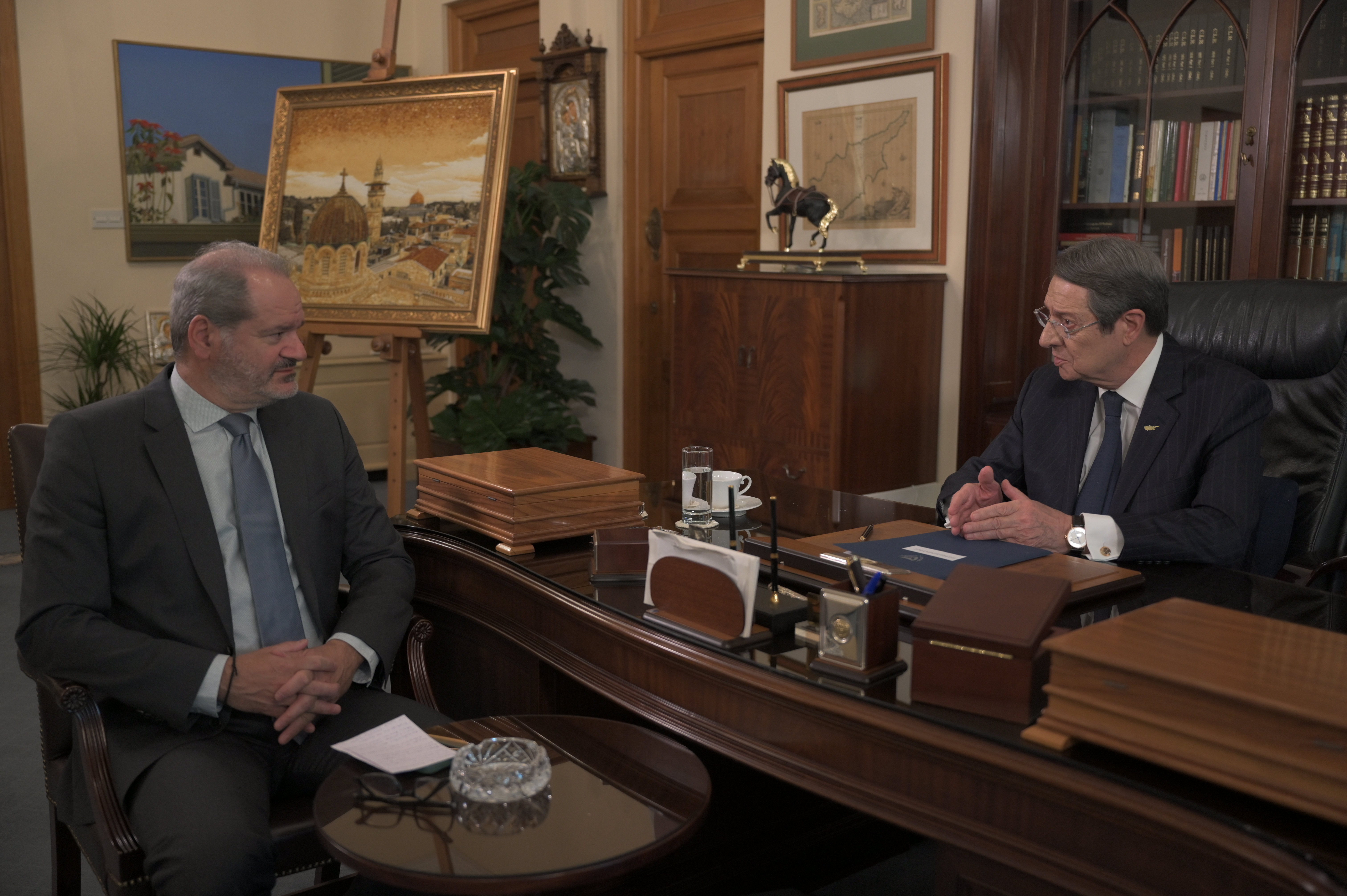
Mont Pelerin and Crans-Montana. Did we not capitalize on Akinci’s presence? Did we also make mistakes?
With Mustafa Akinci we had an excellent cooperation, an excellent friendship, but especially a chemistry, driven by our mutual desire to provide a solution that both communities could accept. We worked hard and intensively and, after 2015, when Mustafa Akinci took over, we were led in 2017, with a lot of convergences and agreements on key issues on the agenda, to Crans-Montana, where the topics of security and withdrawal of troops, which were the most important issues that the Greek-Cypriot community was concerned about, were raised for the first time. At the same time, regarding the concerns of the Turkish Cypriots, they were asking for a positive vote on every decision, which in essence meant a full veto. And we had said yes, I accept the positive vote, but for when and where any proposal of the majority community, the cabinet of Greek-Cypriot ministers, affected or impacted in a negative way the interests of the Turkish-Cypriot community. In such a case they should have the right to feel secure. We had achieved convergences concerning the four freedoms. But let me come to how much either Mr Akinci or myself are responsible for the deadlock. In Mont Pelerin first and later in Geneva in January 2017, regarding the four freedoms that we agreed on, there started to be a retreat on the part of the Turkish Cypriots, always at the behest of the outside, namely Ankara. To be clear.
Which of course never really looked favorably on Akinci’s leadership.
That is absolutely correct. When the free movement, settlement, and purchase of property was supposed to be agreed upon, they said that as far as the purchase of property is concerned, it cannot exceed a limit which can be 80 for one year, 70 the next year, or 100 and so on. In fact, to address the concerns of the Turkish Cypriots, I had said that anybody who does not return as a refugee by right and who comes from a state other than the Greek-Cypriot constituent state, will not have the right to vote in their place of residence but in their place of origin. In this way, the concern of Turkish Cypriots that at some point the free settlement could alter the will of Turkish Cypriots was removed. In this way, they were assured. And so we had come to the conclusion that it was free to buy and reside and practice a profession, for both parts. We had even agreed on the population ratio. We had agreed that it would be a 21% Turkish-Cypriot community in order to stop the [Turkish settlers from the mainland] and a 79% Greek-Cypriot community. It saddens me, you know, when I think of how much progress was made. And we are heading for Crans-Montana, full of hope. On June 4 in New York in a joint meeting with Mr Akinci, the secretary-general says that we have to find a way to replace the anachronistic system of guarantees and as far as security issues are concerned it should be one of the main issues to be discussed because it is of major importance. The secretary-general came on June 28. I must say that he gave the six-point approach – which, if successful, would have been a strategic agreement – including the issue of guarantees and the withdrawal of troops. The impression was given that Mr Cavusoglu had a mandate, and he gave the secretary-general the impression that he would back down from his “Wake up, guarantees are never-ending” motto. In the following days, the special representative of the secretary-general, Mr Eide, unfortunately, instead of faithfully recording the secretary-general’s points, altered them in a way that favored the Turkish-Cypriot community. At my instruction, Mr Mavroyiannis, then a negotiator, sent an SMS for it to exist – and it does exist – saying that what the secretary-general had dictated as the six points was not rendered exactly. So did the Turkish Cypriots who felt that the text was not being rendered well.
On July 4, a meeting was held in the morning and Mr Eide, on the instructions of the secretary-general, when no further progress had been made between the 28th and the 4th, rendered exactly the words of the secretary-general. In person, verbally. And it’s the only meeting where they claim that no minutes were kept, so that there would be some doubt, in order to leave the table not with what he said on July 4. It’s gotten to the point where there was doubt whether that meeting even took place, which is confirmed by the minutes of the afternoon, where he made reference to having been briefed on the secretary-general’s six points that morning. After July 4, I am calling the negotiating team, we are preparing proposals on all six points – that is, on the issues of internal governance and on the issues of guarantees and the army. The secretary-general arrives and everything is overturned by the attitude of Mr Cavusoglu, who said: “No ending of guarantees. The only thing I will accept is 15 years with the right of review and no termination.” The only concession he made in the many discussions was “If you guys are nice enough, to have a review at 10 years.” But it is well known that an agreement to be reviewed needs the consent of both parties. If one refuses – which was a given – it means forever guarantees. The second element was the withdrawal of the army. Yes, there was a fast-track withdrawal agreement upon solution, but Turkey was demanding a permanent military base. This was also suggested to Mr Nikos Kotzias, the then Greek foreign minister, that the British have dominant bases: “Why shouldn’t you have one in the Greek-Cypriot constituent state and we have one in the Turkish-Cypriot constituent state?” Something that was of course rejected. But the obsession was that the end result would not be the 1960s contingents of 650 Turkish soldiers and 950 Greeks. It was that it would have to be one troop because circumstances changed and a larger number was required. In our proposal, we did not rule out the possibility of a multiethnic force in which a Turkish contingent would also participate in order to give the Turkish Cypriots a sense of security. What can I say?
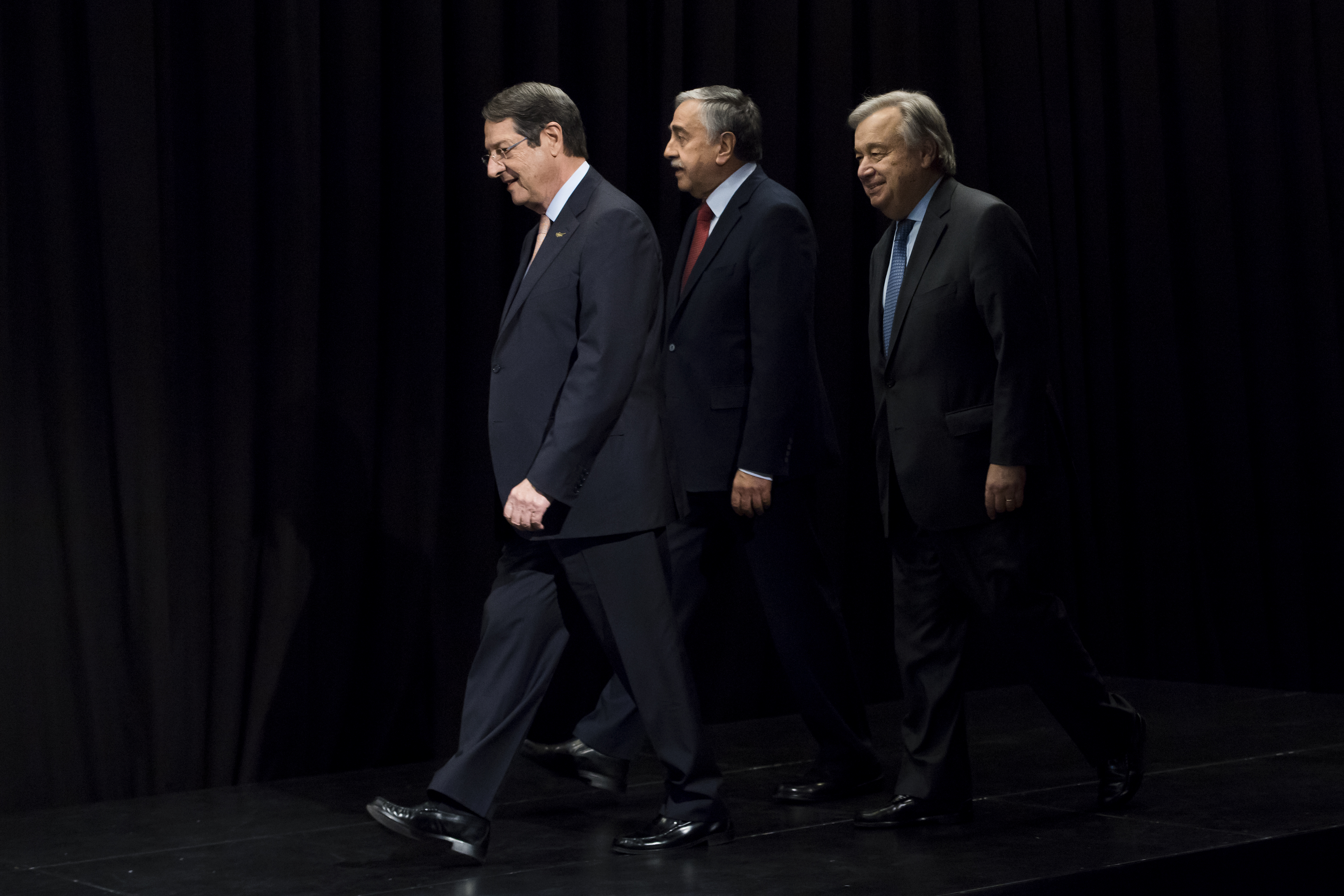
To sum up, where does the responsibility lie?
It lies solely with Turkey and not with the two leaders of Cyprus. We even got to the point of discussing the national anthem, the flag. We were making significant progress and we were getting into the details. I suggested that there should be a triptych. What were the convergences we had achieved, what were the minor differences and what were the major differences? To make sure that we could conclude. Unfortunately, Eide would not listen, so progress could be made. We needed to conclude with smaller differences and then move on to the major issues, where we would need, as we did for the first time in Crans-Montana, the presence of the three guarantors at the table for the first time – the two communities plus the European Union, even if only as an observer. This was one of the most important achievements in the course of the Cyprus issue. The failure was entirely due to the intransigence of Turkey, whose strategic objective has always been, whether since 1956, the events of 63, or 83, when they declared the pseudo-state – the first attempt was then, not now… They simply took advantage of the deadlock and unfortunately here I have to express a frustration that I have with the secretary-general: The next day he was supposed to attend the scheduled G20 meeting in Hamburg, if I am not mistaken. Therefore, he spent very few hours on a half-century problem. But, it is not for the few hours. He could, instead of ending the dialogue that evening, have postponed it. As the thought was, if we ended up closing the issue of guarantees on the troop issues, the prime ministers of the three guarantor nations plus the two communities would meet to decide.
It sincerely saddens me, and it is one of the burdens I carry, to have been so close to finding a solution. I was the seventh president, all presidents without exception made efforts, some less, some more, with differentiations, to find a solution that would lead to a functioning state, a state that would last, that would be in line with the European acquis, that would fully safeguard our Turkish-Cypriot compatriots. Unfortunately, Turkey’s strategic objective remained the one that was first stated in 1956, reiterated with the events of 63, the objectives etc, to be recorded in 83 for the first time and formalized on April 25, 2021 in Geneva, at the informal meeting convened by the secretary-general.
Unprecedented prospects
Does the next president have any hope of being part of a more advanced process?
I have no doubt about the president’s intentions. What I do doubt is whether Turkey finally realizes how many benefits will come out of having a Turkish-Cypriot controlled state, whether in terms of European relations, Euro-Turkish relations, peace in the region, exploitation of energy resources without problems etc. There will be stability in the whole region, because as a result of the aggressive policy, it is not only limited to Cyprus, it extends to the Aegean, Libya, Syria, Iraq, Nagorno-Karabakh. It is a situation which, if a solution is found to the Cyprus issue, will lead to improved relations with a number of countries in the region and with the European Union. The prospects are unprecedented for us, but especially for Turkey.
How much of a role does the absence of an Akinci on the other side play? Is Turkey the main obstacle?
I will relate just one incident and it is not new. In Geneva, in January, we agreed that maps would be submitted, on the territorial issue, and this is the first time that the Turkish side, the Turkish-Cypriot community, would submit a map. Our difference was limited to only a half percent. I insisted that it be limited to 27%. He wanted 28% or so, I don’t remember exactly. The territorial area of the Turkish Cypriot-administered territory. The maps were submitted. Erdogan was furious because he insisted that they should not have been submitted. And after that January [in 2017], he received Mr Akinci much later, in June, before going to New York and then to Crans-Montana. Unfortunately, Turkey has always been the regulator and interferer on the negative side. Turkish Cypriots, because of their economic dependence on settlers, the presence of the Turkish Army, have always been under oppression. Akinci was a courageous Turkish Cypriot who dared, but unfortunately did not have the power to enforce agreements, which is why there was so much backtracking from what was agreed.
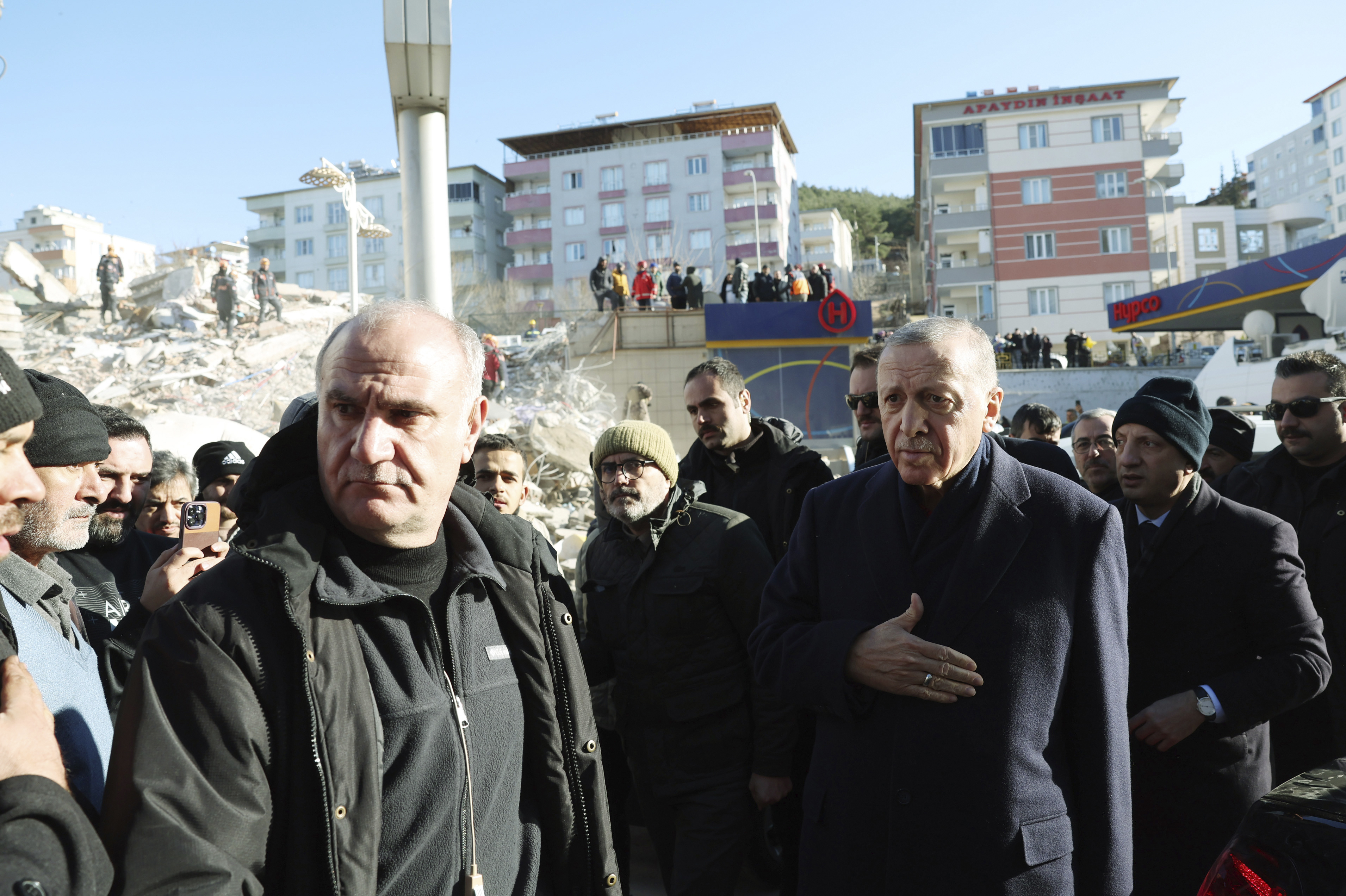
Earthquake diplomacy and the challenges ahead
This brings us to the present day with the recent elections. A thought first about the fact that all three candidates in one way or another were your collaborators. And secondly, how do you see the task – difficult possibly because he is not officially supported by either of the two major parties – of the new president?
As far as the protagonists in the electoral battle, Mr Mavroyiannis was indeed my negotiator on the Cyprus issue for nine years. We had excellent cooperation. He is a man of great ethics and expertise. He is a diplomat of great competence. Mr Christodoulides was the director of my diplomatic office, government spokesman and later, for four years, minister of foreign affairs. And of course the chairman of my party, my dear Averof Neofytou. At some point, I mentioned this and some people were displeased. I said that all three are my colleagues. The left chose the negotiator, the centrist parties chose the minister of foreign affairs and the Democratic Rally claimed the chairman, and I said that all three were excellent colleagues of mine, and I was misunderstood. You can’t disavow collaborators, but that doesn’t mean that I didn’t clearly and actively declare my support for the party’s chairman. However, today, Mr Christodoulides was elected. I know him very well. I know just how many skills he has, how much of a workaholic he is, and therefore I trust that with a non-confrontational approach, with a creative dialogue approach, and taking into account the responsibility of the Democratic Rally, and as the party chairman has assured us, everything is possible. I have no reason to say that AKEL is not reliable, but it may be that due to ideological and political differences, it remains, even these days, negative in passing bills etc. Don’t forget that my presidency for a decade was also – from 2014 onwards – a minority presidency. And despite all the deliberations, in respect to what was tabled in the Parliament, thanks to both the people’s demand and the correct handling of the party chairman, and my interventions, we reached the majorities and so we achieved major reforms in the state, as well as, through fiscal discipline, obtaining positive economic results.
Lastly, with the earthquakes in Turkey, is something changing? Is President-elect Christodoulides facing the same scenario or do you hope that there can be a rapprochement between Greece and Turkey? Can something change because of the humanitarian dimension?
The humanitarian dimension is the one that may alter the hostile feelings created by Erdogan’s revisionism, who by saying that they are challenging our sovereignty also created a feeling among the people that we have enemies before us. The earthquake has helped to reverse this. Now, beyond that, it would be risky to say that the objectives are changing. Unless after the elections he finally reconsiders this megalomania of constantly wanting to be armed, constantly wanting to be a superpower. This is to the detriment of the economy, of society, where important funds could be injected, of relations – which again are to the benefit of the economy – with the European Union, with the states in the region, and so let us hope that some fragments of this new feeling between the two peoples can also influence political thinking, so that he accepts that only dialogue and not military threats or airspace violations can give the result and the solution.
What about the Cyprus issue?
It applies to the Cyprus issue as well. If there is a re-approach and dialogue with Greece, the Cyprus issue certainly cannot be left out. And I think that since the Cyprus issue is considered to be a European problem, there are issues related to Euro-Turkish relations, such as the customs union, revision, liberalization, visas and so on, which concern Turkey, which concern Turkish businessmen, and I believe that the whole picture can change. But that is the hope, the expectation. Let us hope that this expectation will come true.
